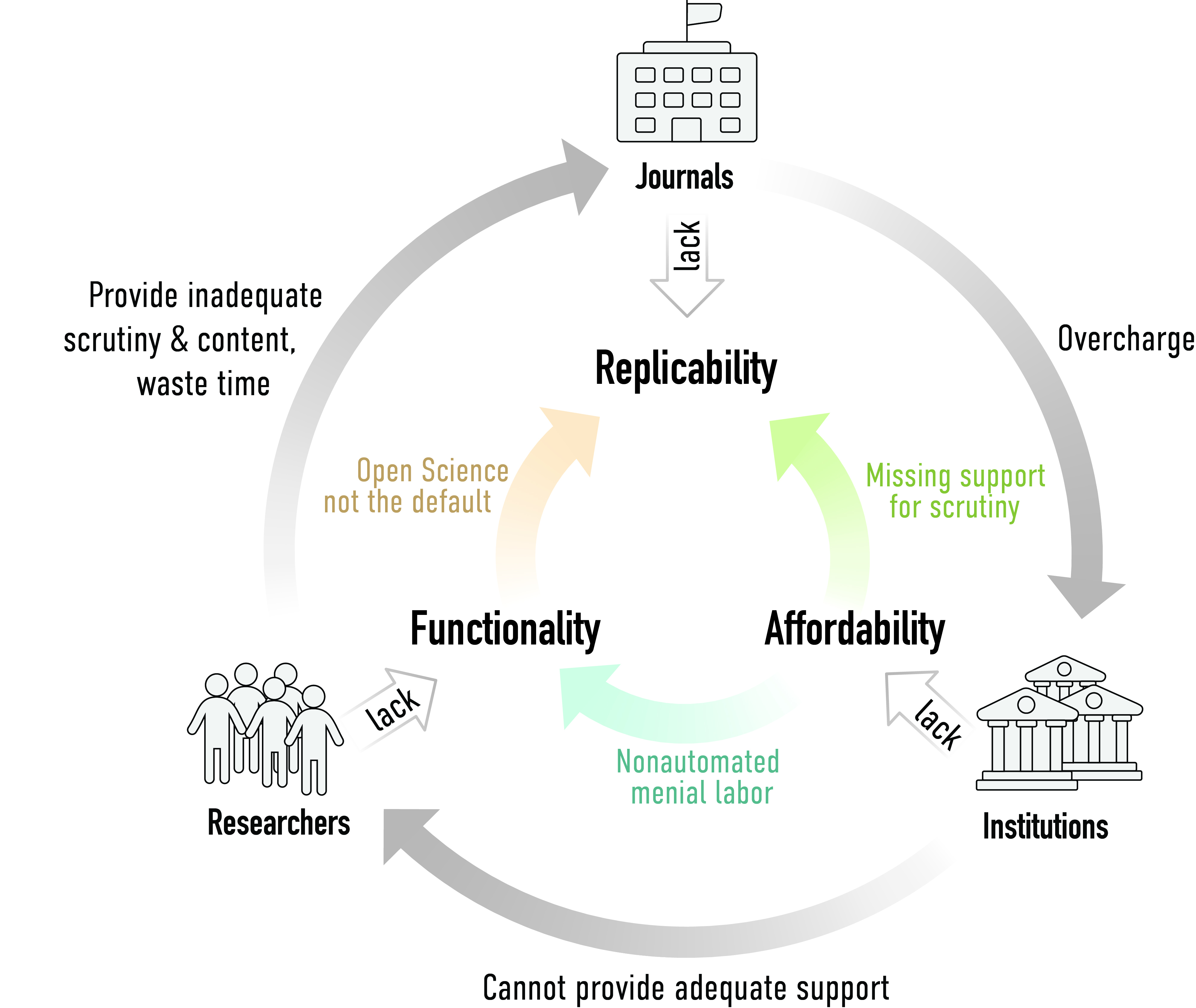Last week’s podium on the commodification of open science entitled “If you are not paying for the product, you are the product?” was surprisingly unanimous on the need to radically modernize academic publishing and abolish the current publishing system relying mainly on corporate publishers with monopoly status. It appeared as if the present funders, librarians, scientists and other experts essentially only argued about how and when this replacement for corporate publishers should be brought abut, not if.
It was also unexpected that this was probably the first time I was not representing the most radical position on the panel. The proposals to remove usage rights from publicly funded research papers, or to ban for-profit publishers altogether, prompted the moderator, Jan-Martin Wiarda, to ask if these were calls for an expropriation of the publishers. Julia Reda was quick to point out that the goal was not to expropriate anybody, but that the accurate technical term for what she was proposing was “collectivization”.
Such collectivization of academic publishing had been brought up several times before the panel, such as in a much-discussed piece by Jason Parry earlier this year, entitled “A world without sci-hub“:
Nationalization could not only address the problems of academic publishing and make scientific work and innovation based on it easier, it could also boost American soft power in an age of waning American geopolitical dominance.
David Wiley has proposed that the federal government take the intellectual property of academic publishers using the power of eminent domain.
Similar opposition to a market-based approach to scholarly publishing has been voiced by experts in the UK, such as Samuel Moore, an organizer of the the Radical Open Access Collective, that states that “as part of our refusal to concede open access to the forces of conservativism and the market, the collective attempts to strengthen alliances between [various related groups]”. He writes in his eminently readable article entitled “Open Access, Plan S and ‘Radically Liberatory’ Forms of Academic Freedom“:
Of course, much of Plan S is market-centric and simply perpetuates the inequities of contemporary neoliberal capitalism.
or
Any transition to open access must be framed as part of a project to emancipate researchers from the values of the neoliberal university and its requirement to publish primarily within the marketized publishing industry.
or
Clearly, Plan S is not designed to address these issues: it is wholly embedded in the liberal political economy of European nation states. The policy cannot and will not improve or fix precarity, biblio-monoculturalism or the marginalization of minority scholarships. To the extent that the APC road is prioritized, Plan S will likely exacerbate these issues by perpetuating a market-based approach. The zero-embargo repository aspect to Plan S, on the other hand, may conform to a more emancipatory approach to publishing and knowledge production, but only if coupled with support for an alternative and diverse ecosystem of non-commercial publishing projects
From the panel discussion and the quoted experts, it appears the parasitic exploitation of scholarship by the ex-publisher monopolists has created a radical backlash aiming to prevent any kind of market to ever be allowed around scholarly works. The proponents of such a collectivization effort point to examples from other economies and markets where collectivization has become necessary. The current handful of major publishers is seen as both an economic threat and as a social and scholarly menace in that “marketized publishing” is said to be inherently unfair and inequitable.
These anti-market experts provide excellent arguments against the status quo and take hard-to-refute positions with regard to equitable scholarship, protections of academic freedom, or scholarly governance. On these issues, there can be little dispute. However, in our proposal to replace academic journals, we outline how a market-based approach can lead to the same goals, by creating an actually functioning market. It appears as if collectivization proponents confuse the current conglomerate of de facto monopolies with a market and from there argue that all markets must be dispensed with. Given the constant use of the word ‘market’ to describe the scholarly publishing industry (not the least by publishers who have a vested interest in appearing to regulators as market-based), this misunderstanding is not surprising. In fact, even the European Commission has a long history of defining this industry as a market, if only from the perspective of the publishers. It appears that this publisher propaganda and lobbying has not only successfully infected the EC, but also scholarly experts seem to be buying into the market-myth of the corporations.
Because well-regulated markets can operate effectively and fairly, scholarly publishing market regulation has been called for by EU experts, even if the market were defined from a publisher perspective. Our proposal goes far beyond such band-aid solutions to a system that is too fundamentally broken to be repaired, as the panel last week unanimously agreed. We propose a market that is characterized by substitutable providers, under the governance of the scholarly community and where the market regulation includes, e.g., open source mandates that prevent future monopolization of any aspect of the market. The world has experienced that planned economies lack innovation and cost control which is exceedingly important for a publicly funded scholarly community. Arguably, therefore, an evidence-based approach to replacing the corporate journals with modern information technology must always be a market-based approach to replace the current system which is not a market.
UPDATE:
A small, informal poll on Twitter seems to reveal that people’s appetite for radical change is larger than one may have expected:















I still remember (late 90s? early 00s?) when publishers (still) behaved like service-providers in a “market”, offering their services to the most prestigious national/international academic societies so they could outsource the heavy task of managing their subscription-based traditional journals. Those were times of quick changes towards digitalization and bibliometrics paired with increases in production of papers and journals, all requiring degrees of editorial professionalization that most researchers were not prepared for (or willing to add to their saturated schedules). As in a traditional story, most accepted the lobbied empowering gift that gradually enslaved them; FF and now here we are, all ruled by The One (or The Few).
I see your point towards the well-regulated market solution rather than a collective, planned service. However, it depends on an amount of hope (equitable? well-regulated? internationally?) that I do not see reflected in how most markets have been moving in my lifetime, a hope that you don’t extend to the reality-based diagnosis of planned, cost ineffective, closed alternatives. Maybe I am lacking good examples of international markets that have remained fair and innovative not moving towards consolidation and financialization, or maybe I do not trust on global immunity against that half-a-pie of “non-publishing costs” that you showed in your previous post, but I think I am more inclined to accept the risks of some extra cost or a potential stagnation in the horizon until we manage to get rid of the Big Problems [though burning them in a volcano may seem a bit excesive?]
Well, this is precisely the question, isn’t it? We know from experience that markets require constant vigilance to be beneficial and we know that planned economies tend to be inefficient, costly and often lack innovation. The choice between such options is difficult and non-trivial. I’m of course biased, but I think in our proposal we have struck a middle-ground in that the infrastructure itself (sort of like pipes and cables) is owned by the institutions and external service providers only come in when needed and are substitutable. However, one can never eliminate all risk, so the basic, tough choice still remains.
The currently broken system is not a market, therefore the solution is a market? Seems a non sequitur to me.
It’s like saying that the UK private railways are not really a market, as they are regional monopolies, so to fix them you necessarily need more competition. Or privately run water companies are monopolies, therefore to improve them you need more competition. And so on.
Being or not “market-based” is just one characteristic among many. Reaganomics would have us believe that’s the main lense through which to look at everything, but that’s just one (failed) dogma. (Similarly fruitless is the distinction between “commercial” and “non-commercial”, which assumes commerce is the main characteristic of social activities, and therefore presumes and strengthens the capitalist forces it claims to fight.)
Reducing the power of academic publishers is always good, because it increases the power of everyone else (including academia and the public); it doesn’t matter how you achieve the goal. Publishers are state-created local monopolies. There’s plenty of historical experience for reversing such monopolies, and collectivization is indeed a commonly used method, so it should not be rejected outright. I’d prefer to discuss whether specific ways of doing it would work or not.
Systems often don’t work because there is no market. Public utilities such as water, waste, etc. are being bought back (collectivized) by German communities precisely because there is no market, only one private monopoly company. So I’m definitely not against collectvization and I think it can work. That being said, I’d say it is similarly uncontroversial that well-regulated markets commonly offer a better performance/cost ratio for customers, as well as improved innovation. Specifically, such a system seems to work reasonably well for other, non-digital infrastructures, where institutions can choose to perform maintenance,installation, repairs, etc. themselves or have contractors come in – and where sufficiently large jobs need to be offered in public tenders.
I agree, the system is not perfect and there certainly are many examples of abuse, but the fact that it is practiced all over the world, means that it doesn’t seem to be easy to come up with an unequivocally better solution?
Comments are closed.